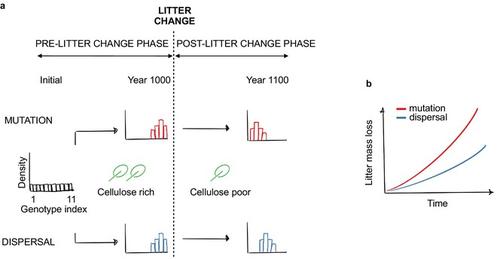当前位置:
X-MOL 学术
›
Ecol. Lett.
›
论文详情
Our official English website, www.x-mol.net, welcomes your
feedback! (Note: you will need to create a separate account there.)
Microbial Evolution Drives Adaptation of Substrate Degradation on Decadal to Centennial Time Scales Relevant to Global Change
Ecology Letters ( IF 7.6 ) Pub Date : 2024-10-16 , DOI: 10.1111/ele.14530 Elsa Abs, David Coulette, Philippe Ciais, Steven D. Allison
Ecology Letters ( IF 7.6 ) Pub Date : 2024-10-16 , DOI: 10.1111/ele.14530 Elsa Abs, David Coulette, Philippe Ciais, Steven D. Allison

|
Understanding microbial adaptation is crucial for predicting how soil carbon dynamics and global biogeochemical cycles will respond to climate change. This study employs the DEMENT model of microbial decomposition, along with empirical mutation and dispersal rates, to explore the roles of mutation and dispersal in the adaptation of soil microbial populations to shifts in litter chemistry, changes that are anticipated with climate‐driven vegetation dynamics. Following a change in litter chemistry, mutation generally allows for a higher rate of litter decomposition than dispersal, especially when dispersal predominantly introduces genotypes already present in the population. These findings challenge the common idea that mutation rates are too low to affect ecosystem processes on ecological timescales. These results demonstrate that evolutionary processes, such as mutation, can help maintain ecosystem functioning as the climate changes.
中文翻译:

微生物进化推动了与全球变化相关的十年到百年时间尺度的底物降解的适应
了解微生物的适应能力对于预测土壤碳动力学和全球生物地球化学循环将如何响应气候变化至关重要。本研究采用微生物分解的 DEMENT 模型,以及经验突变和扩散速率,探索突变和扩散在土壤微生物种群适应凋落物化学变化中的作用,这些变化是气候驱动的植被动态所预期的。在凋落物化学发生变化后,突变通常允许比散布更高的凋落物分解速率,尤其是当散布主要引入种群中已经存在的基因型时。这些发现挑战了突变率太低而无法影响生态时间尺度上的生态系统过程的普遍观点。这些结果表明,随着气候变化,突变等进化过程可以帮助维持生态系统的功能。
更新日期:2024-10-16
中文翻译:

微生物进化推动了与全球变化相关的十年到百年时间尺度的底物降解的适应
了解微生物的适应能力对于预测土壤碳动力学和全球生物地球化学循环将如何响应气候变化至关重要。本研究采用微生物分解的 DEMENT 模型,以及经验突变和扩散速率,探索突变和扩散在土壤微生物种群适应凋落物化学变化中的作用,这些变化是气候驱动的植被动态所预期的。在凋落物化学发生变化后,突变通常允许比散布更高的凋落物分解速率,尤其是当散布主要引入种群中已经存在的基因型时。这些发现挑战了突变率太低而无法影响生态时间尺度上的生态系统过程的普遍观点。这些结果表明,随着气候变化,突变等进化过程可以帮助维持生态系统的功能。






























 京公网安备 11010802027423号
京公网安备 11010802027423号